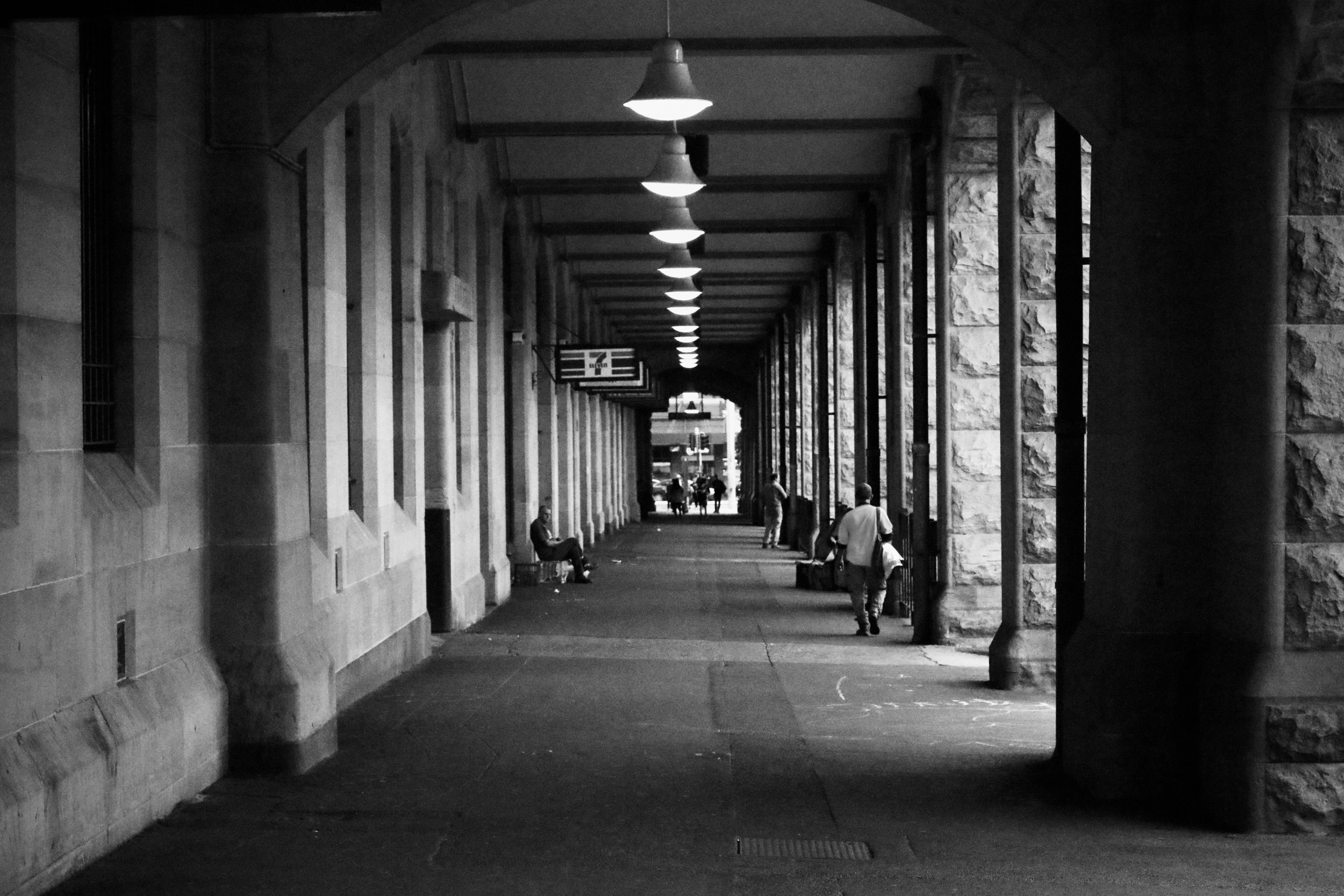Dan and his dog Buster sleep on a bench in Belmore Park, or at least that’s where I found them.
It was nine in the morning and three other men were trying without luck to get some sleep on the benches nearby. As I walked past, Dan adjusted his head and looked up at me. He was a haggard-looking man, thin, with sunken eyes.
Forty-eight, but looking 62, there was something about him that resembled a wild animal: not violent, but feral from lack of rest and care.

Dan and his dog Buster (Photo: Layton Holley)
“Sir,” I said, “I am interviewing the homeless about their lives. May I talk to you?”
“So, you want to know how this happened,” he replied.
Dan ran away from home at 16. He was an army “brat” and was constantly moving throughout his childhood. His Dad was a tyrant, he says. A violent drunk who ruled over his family through fear, and sudden and brutal beatings.
“I hated school, man. But what I hated worse was going home.”
“At least at school, all you have to worry about [are] bullies or dickheads and shit like that, but when you’re home, everything may go just fine or a bloke three times your size might start kicking the shit out of you.
“And you don’t know whether it’s going to happen or not.”

City tracks (Photo: Layton Holley)
By 28, Dan was making $10,000 a week selling crystal meth. He first tried ice in his early twenties while working at a bar on Oxford Street. Before long he was hooked, and began dealing to support his habit.
“Of course, doing that, I lost touch with reality and sunk myself full-time into the criminal milieu. I got myself into all the dangers, all the violence, all the nightmares, everything.”
One day, short for cash and needing a fix, Dan attempted an armed robbery but was caught during his attempted getaway. He was thrown in a cell, and had three years to think about what went wrong.
“We’re surrounded by horror, we are surrounded by despair, we are surrounded by people that… ah, man.”
“Being in jail is like a headache that doesn’t go away; it’s like if you’ve ever waited for a bus, imagine what it’s like waiting three years for a bus. It’s fuckin’ horrible.”
Now, Dan has no job, home or family. He has no possessions in the world apart from his dog and the rags on his back. He is sober and, despite everything, says he’s happy.

—————-
“As soon as mum passed away, my life went downhill.”
Jackie begs around Central Station most days. Sometimes she will try Wynyard or Circular Quay.
Since her mother’s death, she has faced many trials which have led to her unhappy state. She lost her child, her house and her job.
“I’ve had numerous physically abusive relationships,” she says. “”Fourteen years I was going out with “him” – long years. But he was dependent on drugs (ice), and so was I… it wasn’t good.”

Jackie at Central Station (Photo: Layton Holley)
“At the start, they (her partners) are really nice and kind and polite, then all of a sudden that person disappears behind the drugs and you think, well, you know that person is still there, the nice person’s still there, but once drugs are involved, they just turn evil.”
I ask how hard it is for a woman to live on the streets.
“It’s very hard. If you haven’t got somebody there with you, say, maybe a partner or just a friend, it’s dangerous.”
” You’ve got men who want sexual favours or want to pay you for it. It’s just bullshit, you know what I mean? Bullshit. I refuse to do it.”
Jackie mentions painting, and suddenly her downcast eyes turn bright. She was excited, And I could tell that this wasn’t just a hobby, but a passion; a light amidst the gloom.
“I love painting; I used to do it with my mum. It’s therapeutic for me and it makes me happy. Someday I hope I can turn my life around through art.”
————–
Ken’s story begins in Melbourne, he tells me, as we sit on the corner of George and Market Street amidst a bustling crowd.
“There’s three of us; an Indian guy, me, and a seventy-five-year-old man who just retired.”

Ken (Photo: Layton Holley)
I ask Ken what makes him happy.
“People, bro, their kindness. There’s a lot of ugliness amongst it, but there’s a lot of friendly people out there.”
“I battle every day with alcoholics, drug addicts, mentally ill people. The people who are nice to me [are] a tiny percentage, but it makes it all worthwhile.”
— Story and photography, Layton Holley


